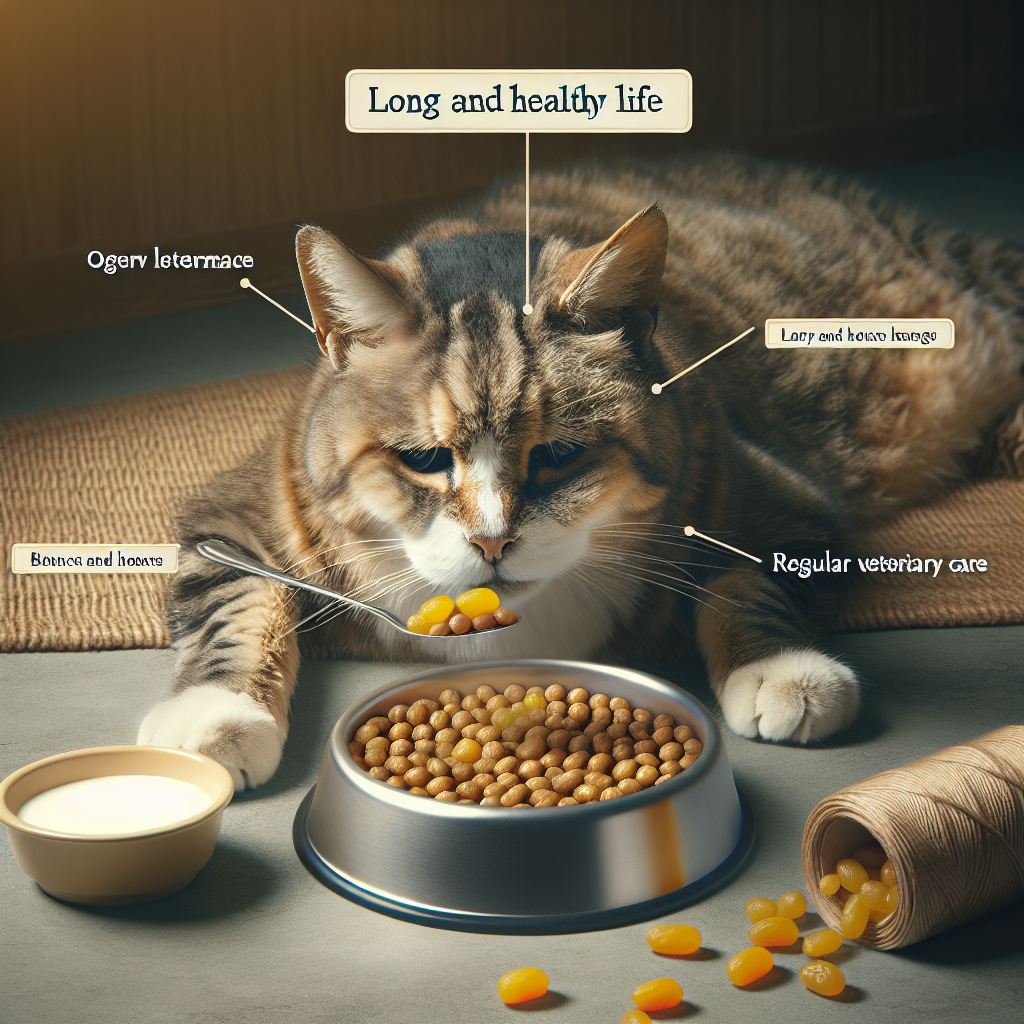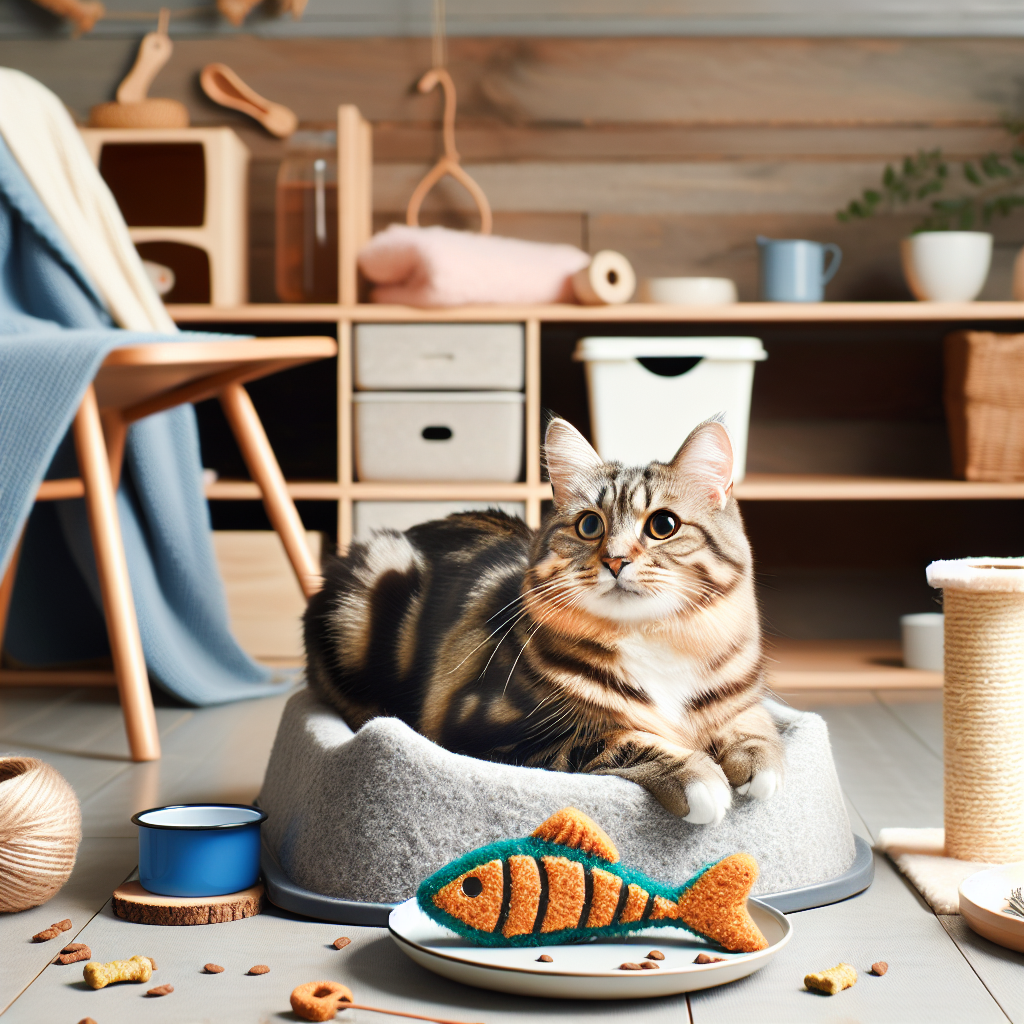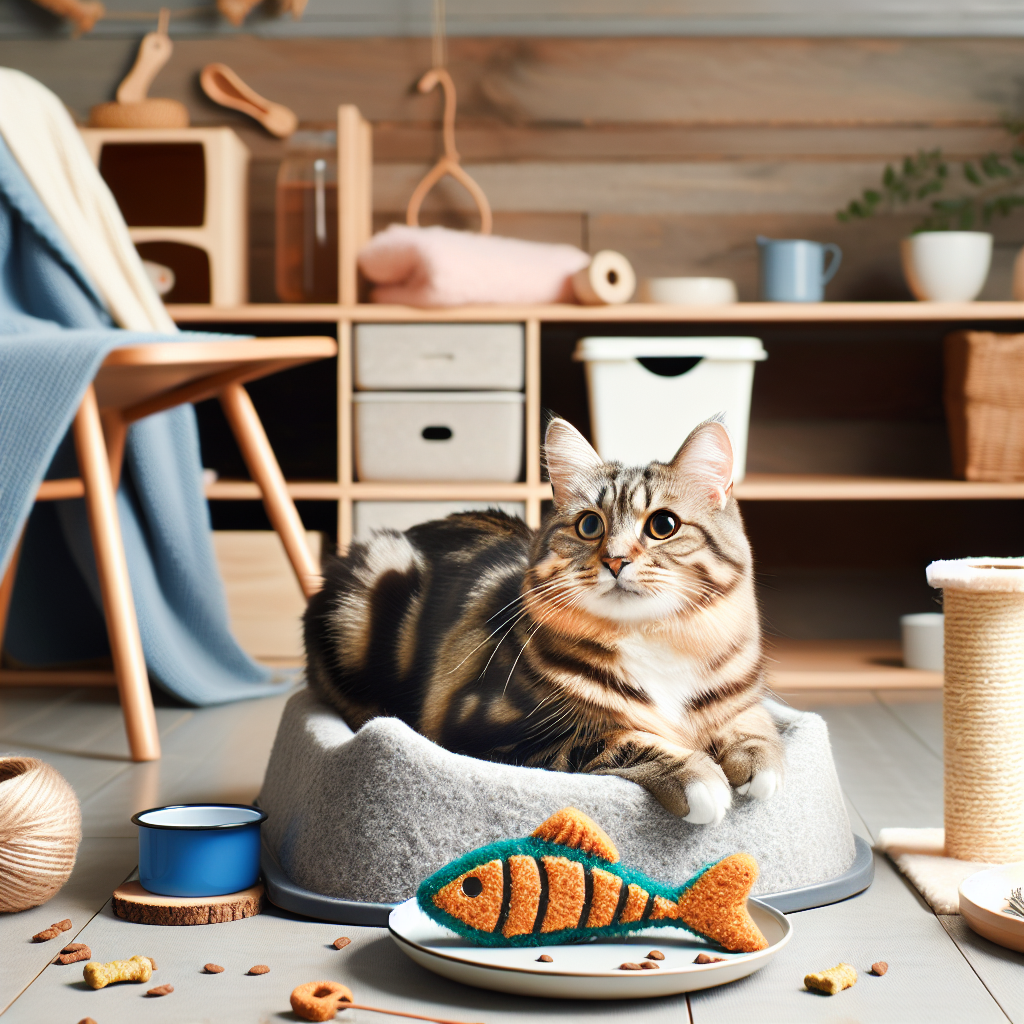Have you ever wondered how long a tabby house cat can live? Tabby cats are a popular choice for many households due to their distinctive markings and friendly nature. In this article, we will explore the average lifespan of tabby house cats and factors that can influence their longevity. Whether you are a proud owner of a tabby cat or considering adopting one, understanding their life expectancy can provide valuable insights into their care and well-being. So, read on to discover the secrets of a tabby cat’s long and healthy life!
Factors that Influence the Lifespan of Tabby House Cats
Genetic Factors
Genetics play a crucial role in determining the lifespan of tabby house cats. The genes inherited from their parents can influence their overall health, susceptibility to certain diseases, and even their longevity. While some genetic factors are beyond our control, responsible breeding practices can help minimize the risk of inherited health conditions.
Diet and Nutrition
Proper nutrition is essential for the overall health and lifespan of tabby house cats. A well-balanced diet helps maintain a healthy weight, supports strong immune function, and reduces the risk of developing chronic diseases. Providing high-quality commercial cat food that meets their nutritional needs is important, along with offering occasional fresh and appropriately portioned treats.
Exercise and Activity Levels
Regular exercise and physical activity are important for tabby house cats to maintain a healthy weight, muscle tone, and mental stimulation. Engaging in playtime activities, providing interactive toys, and setting up designated climbing areas can help keep your cat active and engaged. It is crucial to consider your cat’s age and physical abilities when determining the appropriate amount and type of exercise.
Access to Veterinary Care
Regular veterinary care is vital to ensure the wellbeing and longevity of tabby house cats. Routine check-ups allow for early detection and prevention of potential health issues. Vaccinations, parasite control, dental care, and routine blood tests are all important aspects of maintaining your cat’s health and increasing their lifespan. Establishing a good relationship with a trusted veterinarian can greatly contribute to your cat’s overall quality of life.
Indoor vs. Outdoor Lifestyle
The lifestyle your tabby cat leads can have a significant impact on their lifespan. Indoor cats generally live longer due to reduced exposure to outdoor hazards such as accidents, injuries, and infectious diseases. By providing a safe and stimulating indoor environment, you can help prevent potential dangers and ensure your cat’s well-being. However, if you choose to allow your cat outdoor access, it is crucial to take precautions such as ensuring a secure and enclosed outdoor space or using a leash and harness.
Average Lifespan of Tabby House Cats
Range of Lifespan
The average lifespan of tabby house cats can vary widely. While some cats may live only 10-12 years, others can live well into their late teens or even early twenties. Factors such as genetics, diet, exercise, and overall healthcare greatly influence this range. By providing optimal care and attention to these factors, you can help maximize your cat’s lifespan and ensure they live a long and healthy life.
Male vs. Female Lifespan
In general, female tabby house cats tend to live slightly longer than males. While the difference may not be significant, it is believed to be partly due to the fact that female cats are less prone to certain genetic disorders and have a lower risk of developing certain types of cancer. However, it is important to note that individual factors such as genetics and overall health play a more significant role in determining lifespan than gender alone.
Mixed Breed vs. Purebred Lifespan
Mixed breed tabby house cats typically have a longer lifespan compared to purebred cats. Purebred cats often have a higher risk of inherited health conditions due to selective breeding practices. These specific health problems can impact their lifespan. By choosing a mixed breed cat, you may increase the chances of having a healthier and longer-living companion.

Early Life and Development
Kittenhood
The early stages of life are crucial for the development and future health of tabby house cats. During kittenhood, providing a balanced and nutrient-rich diet is essential to support their growth and overall development. Regular veterinary check-ups, vaccinations, and deworming are also important to protect kittens from potentially life-threatening diseases.
Adolescence
As tabby house cats enter adolescence, it is important to support their transition from kittens to adults. During this stage, they may become more independent and explore their boundaries. Providing plenty of mental and physical stimulation through play and interactive toys helps channel their energy in a positive direction. Regular veterinary care and adherence to vaccination schedules remain essential during the adolescent stage.
Reproductive Period
For those who choose to breed their tabby house cats, the reproductive period can be a significant part of their overall lifespan. Female cats may experience multiple pregnancies in their lifetime, which can lead to physical stress and potential health complications. Responsible breeding practices, appropriate veterinary care, and providing a safe and comfortable environment for the mother and her kittens are crucial during this period.
Adult Life and Aging
Prime Adulthood
Prime adulthood is the stage when tabby house cats reach their physical and reproductive maturity. During this period, maintaining regular veterinary check-ups, a balanced diet, and exercise is important to promote their overall health and prevent the onset of age-related diseases. It is also recommended to spay or neuter your cat to prevent certain types of cancers and unwanted litters.
Middle Age
Middle age is a transitional stage for tabby house cats where they may start to experience subtle changes in their health. Regular veterinary visits become even more crucial during this stage to monitor their physical condition and detect any potential health issues early on. Maintaining a balanced diet, providing appropriate exercise, and stimulating mental activities all contribute to a healthy middle age and can help extend their lifespan.
Senior Years
As tabby house cats enter their senior years, they may require more specialized care and attention. Regular veterinary check-ups become even more important to address age-related issues, monitor organ function, and manage chronic conditions. Adjustments to their diet, providing joint supplements, and opportunities for gentle exercise and mental stimulation can help maintain their overall well-being during this stage.

Health Considerations and Common Diseases
Proper Vaccinations
Vaccinations are crucial in protecting tabby house cats from potentially life-threatening diseases. Adhering to the recommended vaccination schedule provided by your veterinarian helps ensure your cat is protected from illnesses such as rabies, feline distemper, and feline leukemia. Regular booster shots are necessary to maintain their immunity throughout their lifespan.
Parasites
Parasites pose a significant health risk to tabby house cats. Fleas, ticks, intestinal worms, and heartworms can lead to a range of health problems, including anemia, skin infections, and internal organ damage. Regular preventative treatments and routine checks for parasites can help mitigate these risks and improve your cat’s overall quality of life.
Dental Health
Oral health is often overlooked but plays a vital role in the overall well-being of tabby house cats. Poor dental health can lead to gum disease, tooth decay, and even systemic infections. Regular brushing of your cat’s teeth, providing dental treats, and scheduling professional dental cleanings are important preventive measures to maintain their oral health and potentially increase their lifespan.
Kidney Disease
Chronic kidney disease is a common condition among older tabby house cats. Keeping your cat hydrated and providing them with a balanced diet that supports kidney function is crucial in preventing or delaying the onset of this disease. Regular veterinary monitoring, blood tests, and access to fresh water are key factors in maintaining their kidney health.
Heart Conditions
Tabby house cats can also be prone to heart conditions such as hypertrophic cardiomyopathy and heart murmurs. Regular check-ups, listening for any unusual heart sounds, and monitoring any potential symptoms are essential. Following your veterinarian’s recommendations for managing heart conditions, including medication, can help ensure your cat leads a comfortable and extended life.
Cancer
Like humans, cats can develop various forms of cancer. Some cancers are more common in specific breeds, while others are more prevalent in older cats. Regular veterinary check-ups and routine screenings are crucial for early detection and treatment. Cancer treatments such as surgery, chemotherapy, and radiation therapy may be options to consider, depending on the type and stage of cancer.
Arthritis
As tabby house cats age, they may experience joint issues such as arthritis. Providing comfortable resting areas, incorporating joint supplements into their diet, and encouraging gentle exercise can help alleviate pain and improve mobility. Regular veterinary consultations can guide you in managing arthritis and providing appropriate pain management solutions.
Caring for Elderly Tabby Cats
Regular Veterinary Visits
As tabby cats enter their senior years, it is important to schedule regular veterinary visits to monitor their health and address any age-related issues. Your veterinarian may recommend additional blood tests, screenings, or adjustments in medication to ensure their well-being. These visits provide an opportunity to catch potential health problems early, helping maintain your cat’s quality of life for as long as possible.
Nutritional Needs
Elderly tabby cats may have specific nutritional requirements to support their aging bodies. Consult with your veterinarian to determine an appropriate diet that meets their needs and addresses any potential health concerns. Foods with added supplements such as joint-supporting ingredients and antioxidants may help improve their overall health and provide relief from age-related conditions.
Exercise and Mental Stimulation
While physical ability may change in senior tabby cats, it is still important to provide them with gentle exercise opportunities. Low-impact activities such as interactive toys and gentle play sessions can help maintain their muscle tone and mental stimulation. Catering to their changing abilities and preferences is essential for ensuring their well-being and overall happiness.
Environmental Adaptations
As tabby cats age, they may face challenges with mobility, vision, and balance. Modifying their environment to meet their changing needs ensures their safety and comfort. Consider providing ramps or steps to help them reach elevated surfaces, placing litter boxes on easy-access levels, and providing soft and comfortable bedding. These adaptations can reduce the risk of accidents and injuries, and improve their overall quality of life.
Managing Chronic Conditions
Many tabby cats develop chronic conditions as they age, such as diabetes, kidney disease, or arthritis. Close monitoring, proper medication management, and adhering to your veterinarian’s recommendations are crucial in managing these conditions. Regular blood tests, medication administration, and special dietary considerations are essential for maintaining their health and extending their lifespan.
Other Factors Affecting Lifespan
Spaying or Neutering
Spaying or neutering your tabby cat not only helps control the pet population but also offers several health benefits. Spaying female cats significantly reduces the risk of mammary tumors and eliminates the risk of common reproductive system diseases. Neutering male cats can prevent certain types of cancer and reduces the risk of roaming, fighting, and contracting diseases. These procedures are typically performed at a young age to maximize their benefits and potentially increase their lifespan.
Outdoor Hazards
Tabby cats that have access to the outdoors face potential hazards such as traffic accidents, encounters with aggressive animals, exposure to toxic substances, and the risk of getting lost. These dangers can significantly impact their lifespan. If you choose to give your cat outdoor access, ensuring a secure and enclosed outdoor space or using a leash and harness can help mitigate these risks and keep your cat safe.
Accidents and Injuries
Accidents and injuries can occur at any stage of life. Whether it’s falls from heights, encounters with other animals, or household accidents, taking precautions to prevent accidents is important. Ensuring a safe and cat-friendly environment, providing appropriate supervision, and addressing potential hazards can help minimize the risk of accidents and increase your cat’s chances of living a long and healthy life.
Stress and Anxiety
High levels of stress and anxiety can have a negative impact on the overall health and lifespan of tabby house cats. Factors such as changes in environment, loud noises, and conflicts with other pets or humans can all contribute to increased stress levels. Providing a calm and secure living environment, offering plenty of mental and physical stimulation, and addressing any potential sources of stress are crucial in ensuring your cat’s well-being.
Quality of Living Environment
The quality of your cat’s living environment plays a significant role in their overall lifespan. Providing a safe and stimulating indoor environment can help protect them from outdoor hazards, while also offering mental and physical stimulation. A stress-free, clean, and comfortable living space, along with plenty of affection and attention from their human companions, contributes to their overall health and happiness.
Tips for Extending Your Tabby Cat’s Lifespan
Balanced Diet and Proper Feeding
Providing a nutritionally balanced diet that meets your tabby cat’s specific needs is essential for their overall health and lifespan. Consult with your veterinarian to determine the appropriate type and amount of food to feed your cat. Avoid overfeeding and monitor their weight to prevent obesity-related health problems. Follow the feeding guidelines provided by the pet food manufacturer and resist the temptation to indulge them excessively with treats.
Regular Exercise and Playtime
Regular exercise and playtime are important for maintaining your tabby cat’s physical health and mental stimulation. Engaging in interactive play sessions, providing toys that encourage physical activity, and setting aside dedicated playtime each day can help keep them active and prevent weight gain. Remember to adapt exercise routines as your cat ages to accommodate their changing abilities.
Maintaining a Safe and Stimulating Environment
Creating a safe and stimulating environment for your tabby cat is essential for their mental and physical well-being. Provide scratching posts, climbing trees, and interactive toys to keep them physically engaged. Additionally, ensure their living space is free from potential hazards such as toxic plants, exposed electrical cords, and any unsafe objects that may cause injury.
Veterinary Care and Preventative Measures
Regular visits to the veterinarian are crucial in providing preventive care and early detection of potential health problems. Schedule routine check-ups, vaccinations, and parasite preventatives as recommended by your veterinarian. Adhering to these preventative measures ensures your cat’s optimal health and increases their chances of a longer lifespan.
Attention to Mental and Emotional Well-being
Cats are social animals and thrive on affection and attention from their human companions. Providing regular positive interactions, maintaining a consistent routine, and ensuring they have access to stimulating toys and activities can help prevent boredom and improve their mental well-being. Dedicate time daily for bonding and play to strengthen your relationship and promote their overall happiness.
Coping with the Loss of a Tabby Cat
Grief and Bereavement
Losing a beloved tabby cat can be a deeply emotional experience. It is important to recognize and allow yourself to grieve. Everyone copes with loss differently, so give yourself time and space to process your feelings. Surround yourself with supportive loved ones who understand the bond you shared with your cat and offer comfort during this challenging time.
Support Systems
During the grieving process, connecting with others who have experienced similar loss can provide great comfort. Whether it is through online support groups, local pet loss support organizations, or seeking guidance from a grief counselor, finding a support system can help you navigate the grieving process and feel understood in your loss.
Honoring the Memory of Your Cat
Creating a meaningful tribute to honor the memory of your tabby cat can be a helpful step in the healing process. Some ideas include planting a tree or flower in their memory, creating a photo album or digital slideshow of their life, or making a donation to an animal welfare organization in their name. Choose a tribute that speaks to your personal connection with your cat and celebrate the love and joy they brought into your life.
Conclusion
The lifespan of tabby house cats is influenced by a multitude of factors, including genetics, diet and nutrition, exercise, veterinary care, and living environment. By providing optimal care and attention to these factors, you can help ensure a long and healthy life for your beloved tabby cat. Regular veterinary check-ups, a balanced diet, regular exercise and mental stimulation, and a safe living environment all contribute to their overall well-being. Remember to cherish each moment spent with your furry companion, making their life as happy and fulfilling as possible.

